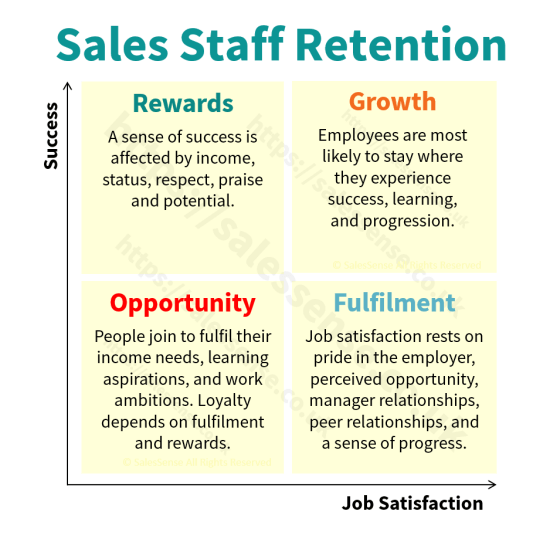How to connect what you sell with reduced staff turnover.

Staff turnover has an eye-watering impact on the profitability of a business.
The bottom line cost of sales staff turnover in a company of 35 people that I worked with, exceeded £1m in the year of the study.
How does what you sell, reduce staff turnover?
Each of the business aspects that we have examined can help reduce staff turnover:
- Reduced Costs
Reducing costs frees up money that could be used to improve training, the work environment, management, or working conditions which in turn reduces staff turnover and frees up more money.
- Increased Profits
Similarly, money from increased profits can be used to improve the employee experience which reduces staff turnover and increases profits.
- Saved Time
Saving time increases job satisfaction, productivity, and morale.
- Improved Reputation
Improving reputation also Increases job satisfaction, a sense of pride, and morale.
- Increased Morale
Morale is closely connected with the reduction of staff turnover.
Add a REDUCED STAFF TURNOVER section to the table that you started.
Share your conclusions about the connections between reduced staff turnover and what you sell in the comments or send it to me for feedback: clive@salessense.co.uk
Free B2B Sales Training Course Index
Mastering the Art of Self-Learning
Learning independently is an invaluable skill, one that can be honed through thoughtful strategies and a proactive mindset. Here’s how you can effectively guide yourself on a path of continuous self-improvement:
Define Your Purpose
Know Your Why: Start with a clear understanding of what you want to learn and why it matters to you. This sense of purpose will drive your efforts and keep you motivated. Break your larger goals into smaller, actionable steps that are easier to tackle and track.
Develop a Learning Blueprint
Plan Your Path: Create a structured approach to your learning journey. Identify the tools, resources, and time you’ll need. Scheduling dedicated time slots for learning will help build a steady rhythm, turning study into a habit rather than a chore.
Source the Best Materials
Be Selective: Not all resources are equally valuable. Look for high-quality books, videos, courses, and articles that are respected in the field you’re studying. Use a variety of sources to get a well-rounded perspective and to help solidify your understanding through different formats and methods.
Dive into Active Learning
Get Engaged: Passive reading or watching isn’t enough. Take notes, summarise key points, and challenge yourself with questions that test your comprehension. Better yet, try teaching what you’ve learned to someone else; it’s one of the most effective ways to deepen your understanding.
Practice Makes Progress
Regular Application is Key: Whatever skill or knowledge you’re pursuing, put it into practice frequently. Practical application reinforces what you’ve learned and turns theory into tangible skills. Embrace mistakes—they are opportunities for growth and new insights.
Evaluate and Evolve
Assess Your Journey: Regularly review what you’ve accomplished to identify what’s working and what isn’t. Don’t be afraid to pivot or refine your methods if needed. The ability to adapt is crucial in any learning endeavour.
Foster a Resilient Mindset
See Setbacks as Stepping Stones: View obstacles as part of the learning curve. Cultivating resilience will help you push through difficult moments and stay committed to your goals. Remember, learning is rarely a straight line; it’s a series of twists, turns, and growth opportunities.
Engage with a Learning Network
Seek Out Companions on the Journey: Learning is often enhanced by interaction with others. Connect with peers, mentors, or communities that share your interests. Engaging in conversations, joining forums, and participating in study groups can offer fresh perspectives and valuable feedback.
Stay Open and Curious
Wander Beyond the Obvious: Don’t limit yourself to a single approach or field. Allow curiosity to lead you to new topics and questions. A diverse set of interests can often cross-pollinate, leading to richer understanding and unexpected insights.
Balance Your Effort with Self-Care
Prioritise Your Well-Being: Intense focus is important, but so is knowing when to take a step back. Balance your learning with adequate rest and relaxation. Celebrate your progress with small rewards to keep the journey enjoyable and sustainable.
By embracing these methods, you can empower yourself to become a self-directed learner, capable of navigating new challenges and continuously expanding your horizons.
More ways to achieve learning momentum:
Take our sales courses.
If you have the discipline of an autodidact, use our self-led B2B sales training course. See the index here. This page presents 2.35, about quantifying the improved morale value of what you sell. If you need more, have any of our B2B sales training courses or any element or combination of elements delivered for groups or individuals through online sales training sessions or one-to-one coaching. Call +44 (0)1392 851500 or email jimm@salessense.co.uk for details.












